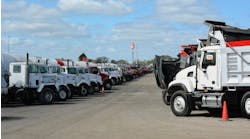Frigid temperatures and harsh winter conditions are hard on any vehicle, especially fleet vehicles that are on the road for 10 to 12 hours a day. Performing routine maintenance will help fleet managers avoid emergency repairs and costly downtime during the coldest months of the year.
Before snow falls and temperatures drop, prepare your vehicles for the season with this maintenance checklist.
Use winterized fuel: The two most common cold weather complaints are a drop in fuel economy or, worse, vehicles that refuse to start when temperatures dip below zero. Seasonally-enhanced fuels will operate in temperatures as low as negative 30° Fahrenheit and have a cold filter plugging point (CFPP) of negative 55° Fahrenheit. A special additive package also increases horsepower and fuel economy up to 5%, so fleet vehicles can stay on the road while reducing fuel costs.
Drain the water separator and replace filters: Water in the fuel system can damage fuel pumps and injectors in sub-zero temperatures. This creates cold engine startup issues that some fleet owners assume is “fuel gelling.” It’s more likely that water is turning to ice in fuel storage tanks and filtration systems, plugging filters during the first couple of cold snaps. Avoid those issues by replacing water-absorbing filters and regularly draining the water separator.
Perform proactive maintenance: Cold weather can wreak havoc on wearable components. Proactive maintenance such as replacing worn belts, hoses and brake pads can save you from expensive repairs down the road. Test the battery and clean the connections. Don’t forget to check glow plug operation on diesel models.
Check your fluids: All engine oils are not created equal, and running the wrong oil in the winter can cause unnecessary engine wear. Heavier oils might be too viscous to achieve effective lubrication at low temperatures. For easier cold cranking and startup, switch to a full-synthetic oil with a lower cold temperature viscosity formulated to operate in a wide range of temperatures. Refer to your owner’s manual for manufacturer cold-weather viscosity recommendations. Also, don’t forget to check and top off coolant, power steering, brake and windshield washer fluids.
Clean and inspect the exterior: The best way to protect the exterior of vehicles from snow, ice and salt is with a thorough cleaning and a coat of wax before winter conditions set in. Wash the cab, body and undercarriage regularly to remove corrosive salts and deicers to prevent body damage.
Don’t forget your drivers: During winter months, you want fleet drivers to be safe, warm and comfortable in the cab. Check heater and defroster operation, and equip every vehicle with an emergency kit containing water, road flares, a fire extinguisher, reflective triangles, a solar blanket, jumper cables, etc.
Winter can be a major challenge for fleet managers and drivers, but taking small steps to prepare for cold weather will keep your fleet vehicles running smoothly all winter long.
—Ron Jessen, author of this post, is director of product management and business development for Cenex brand refined fuels. Ron says he is “passionate” about developing products to help fleet owners and farmers succeed.



